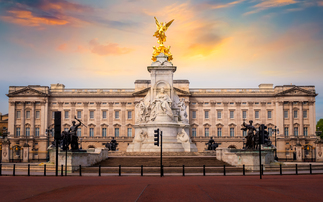The new government's commitment to climate action is serious, but its failure to talk about it this week is a dereliction of duty
Does the collective silence about climate change and the green economy at this week's Conservative Party conference matter? The answer, as with much else in our increasingly contradictory and disorientating political landscape, is a qualified yes, a caveated no.
If you wish to borrow the rose tinted spectacles from the government's three Brexiteers for a second, it is clear tangible policy action is more important than crowd-pleasing political oratory.
The May government has rubberstamped the fifth carbon budget, moved to ratify the Paris Agreement, and signalled low carbon infrastructure will be a key part of its industrial strategy.
Against this backdrop the few comments on climate change and the green economy from the platform this week were hugely encouraging. Business Secretary Greg Clark again made plain he understands the "massive opportunity" presented by a clean tech-led "upgrade" to the UK economy. Environment Secretary Andrea Leadsom sounded passionate and sincere about her commitment to climate action and the natural world. And Chancellor Philip Hammond may not have uttered the words 'low carbon infrastructure', but he hinted how they could yet dominate his plans for increased infrastructure investment.
As such it is possible to argue the reluctance of May and her top team to talk about climate change and environmental issues this week will make not a jot of difference to green investment trends. It is the upcoming low carbon industrial strategy, coupled with the imminent capacity and clean energy auctions and the complex Brexit negotiations - not the content of the Prime Minister's speech this afternoon - which will help determine the short to medium term future of the UK's green economy.
Moreover, what else was anyone expecting? There are plenty of industries, sectors and issues that have been ignored or glossed over this week as Brexit has sucked up all the oxygen in the hall - why should the green economy be any different? This is a hubris-filled Conservative Party conference hopped up on Brexit optimism and dreams of blue passports to the extent that parts of it look like a UKIP victory parade - if one thing is clear about Theresa May it is that she knows when not to alienate her audience.
And yet, words still matter.
It is Theresa May's burden and privilege to emerge as a world leader at a time of unprecedented risks and gargantuan opportunities - and I am not just talking about Brexit. The Paris Agreement will enter into force in just over a month's time, setting the world's governments a non-negotiable goal of building a net zero emission economy within a matter of decades. As the latest essential read from Vox's Dave Roberts makes plain this week no government in the world is anywhere close to internalising and acting upon this goal. The pace and scale of clean tech deployment that is required, not to mention the sharp halt to fossil fuel exploration that is similarly necessitated, is still not being properly countenanced in either the corridors of power or the homes of voters.
Faced with this cognitive dissonance world leaders have two duties: to deliver climate policies that are as ambitious and stretching as politically possible (a test every green business will be hoping May and her ministers pass in the coming months with the promised low carbon industrial strategy); and to use every opportunity to shift the so-called Overton Window and build public support for the still more ambitious green policies and investments that are required (a test May appears to be fumbling badly this week).
The most frustrating aspect of all of this - apart from the imminent collapse of a habitable biosphere, of course - is it would be remarkably easy to weave a public commitment to climate action into the themes the May team is attempting to establish.
You want to nurture a reputation for business-like competence? What is more competent than recognising a long-term risk and tackling it? You are known for a no-nonsense desire to tell it like it is? This is precisely what climate change requires from our leaders. You want a country, economy and environment that 'works for everyone'? The low carbon economy is at its heart about efficiency, productivity, and improved quality of life for all. You've said your government will focus on easing pressure on those who are 'just about managing'? Done right, green investment reduces costs and creates secure, high value jobs. You are preparing the ground for a 'Hard Brexit'? If the UK is to go it alone its clean tech science base will become more important than ever. You wish to channel the last great period of British industrial ascendancy? We led the last industrial revolution, why can't we lead the next one?
Over the past few years President Obama has offered a master class in how to harness this type of rhetoric, building support for climate action in a way that has then made it possible to push through ambitious policies in a political climate that is even more hostile than that which May faces.
It would be both easy and fitting for May to insert a few short lines in her speech this afternoon, underlining what her stated support for the Paris Agreement and the fifth carbon budget means in practice.
"We voted to leave the EU, but we didn't vote to leave the planet," she could say. "That is why I am proud one of my first acts as Prime Minister was to confirm the UK will ratify the historic Paris Agreement on climate change.
"Let me be clear: climate change is one of the gravest threats and greatest opportunities we all face.
"The UK will continue to work with its international partners, including our European neighbours, to tackle this challenge, not just because as Conservatives we are the true party environmental responsibility, but because it is clean technologies that will drive our future economic growth and improve the lives of millions of people.
"It was almost 150 years ago in this great city of Birmingham, in the midst of the last industrial revolution, that Joseph Chamberlain showed how strong government and businesses and politicians working together could provide the infrastructure and build the institutions that transformed the lives of millions of people.
"Now we are in the midst of a new industrial revolution and once again our great towns and cities need to tackle the challenges they face - the air pollution, the housing shortage, the congestion on our roads, the overcrowded trains, and the threat of flooding.
"Through my government's new industrial strategy and its commitment to the Paris Agreement we will overcome these challenges. From clean energy to electric cars, from warm homes to flood defences, from beautiful parks and forests to commuter trains where you don't have to fight for a seat, we will build on the success of David Cameron's government and ensure we are once again the greenest government ever."
It would be simple for the Prime Minister to say all of this or something similar, and such is her position of political ascendancy that she would be cheered from the rafters for doing so, not just by the Party faithful, but by a business community that is increasingly fearful her Brexit strategy threatens a self-inflicted recession, and by centrist voters who feel the political camps in which they once felt comfortable have been torched in recent months.
In reality, it remains highly unlikely May will have anything of consequence to say on the greatest long term challenge her generation of leaders face. If so it will only add to a collective silence that amounts to a dereliction of duty far greater than the cavalier approach to Brexit that has taken shape over the past few days.









